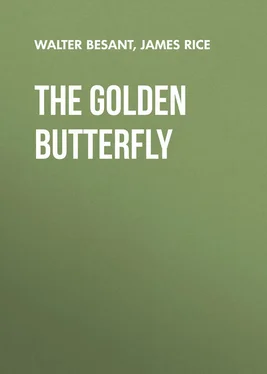Walter Besant - The Golden Butterfly
Здесь есть возможность читать онлайн «Walter Besant - The Golden Butterfly» — ознакомительный отрывок электронной книги совершенно бесплатно, а после прочтения отрывка купить полную версию. В некоторых случаях можно слушать аудио, скачать через торрент в формате fb2 и присутствует краткое содержание. Жанр: foreign_antique, foreign_prose, на английском языке. Описание произведения, (предисловие) а так же отзывы посетителей доступны на портале библиотеки ЛибКат.
- Название:The Golden Butterfly
- Автор:
- Жанр:
- Год:неизвестен
- ISBN:нет данных
- Рейтинг книги:3 / 5. Голосов: 1
-
Избранное:Добавить в избранное
- Отзывы:
-
Ваша оценка:
- 60
- 1
- 2
- 3
- 4
- 5
The Golden Butterfly: краткое содержание, описание и аннотация
Предлагаем к чтению аннотацию, описание, краткое содержание или предисловие (зависит от того, что написал сам автор книги «The Golden Butterfly»). Если вы не нашли необходимую информацию о книге — напишите в комментариях, мы постараемся отыскать её.
The Golden Butterfly — читать онлайн ознакомительный отрывок
Ниже представлен текст книги, разбитый по страницам. Система сохранения места последней прочитанной страницы, позволяет с удобством читать онлайн бесплатно книгу «The Golden Butterfly», без необходимости каждый раз заново искать на чём Вы остановились. Поставьте закладку, и сможете в любой момент перейти на страницу, на которой закончили чтение.
Интервал:
Закладка:
When he was twenty-five, and became a partner, the brethren returned to England simultaneously, and were good enough to live with him and upon him. They had their £200 a year each, and expensive tastes. Joseph, who had made a thousand for his share the first year of his admission to the firm, had no expensive tastes, and a profound respect for genius. He took in the twins joyfully, and they stayed with him. When his senior partner died, and Mr. Fairlight retired, so that Joseph's income was largely increased, they made him move from Torrington Square, where the houses are small, to Carnarvon Square, and regulated his household for him on the broadest and most liberal scale. Needless to say, no part of the little income, which barely served the twins with pocket-money and their menus plaisirs , went towards the housekeeping. Cornelius, poet and philosopher, superintended the dinner and daily interviewed the cook. Humphrey, the devotee of art, who furnished the rooms according to the latest designs of the most correct taste, was in command of the cellar. Cornelius took the best sitting-room for himself, provided it with books, easy-chairs, and an immense study-table with countless drawers. He called it carelessly his Workshop. The room on the first floor overlooking Mulgrave Street, and consequently with a north aspect, was appropriated by Humphrey. He called it his Studio, and furnished it in character, not forgetting the easy-chairs. Joseph had the back room behind the dining-room for himself; it was not called a study or a library, but Mr. Joseph's room. He sat in it alone every evening, at work. There was also a drawing-room, but it was never used. They dined together at half-past six: Cornelius sat at the head, and Humphrey at the foot, Joseph at one side. Art and Intellect, thus happily met together and housed under one roof, talked to each other. Joseph ate his dinner in silence. Art held his glass to the light, and flashed into enthusiasm over the matchless sparkle, the divine hues, the incomparable radiance, of the wine. Intellect, with a sigh, as one who regrets the loss of a sense, congratulated his brother on his vivid passion for colour, and, taking another glass, discoursed on the æsthetic aspects of a vintage wine. Joseph drank one glass of claret, after which he retired to his den, and left the brethren to finish the bottle. After dinner the twins sometimes went to the theatre, or they repaired arm-in-arm to their club – the Renaissance, now past its prime and a little fogyish; mostly they sat in the Studio or in the Workshop, in two arm-chairs, with a table between them, smoked pipes, and drank brandy and potash-water. They went to bed at any time they felt sleepy – perhaps at twelve, and perhaps at three. Joseph went to bed at half-past ten. The brethren generally breakfasted at eleven, Joseph at eight. After breakfast, unless on rainy days, a uniform custom was observed. Cornelius, poet and philosopher, went to the window and looked out.
Humphrey, artist, and therefore a man of intuitive sympathies, followed him. Then he patted Cornelius on the shoulder, and shook his head.
"Brother, I know your thought. You want to drag me from my work; you think it has been too much for me lately. You are too anxious about me."
Cornelius smiled.
"Not on my own account too, Humphrey?"
"True – on your account. Let us go out at once, brother. Ah, why did you choose so vast a subject?"
Cornelius was engaged – had been engaged for twenty years – upon an epic poem, entitled the Upheaving of Ælfred . The school he belonged to would not, of course, demean themselves by speaking of Alfred. To them Edward was Eadward, Edgar was Eadgar, and old Canute was Knut. In the same way Cicero became Kikero, Virgil was Vergil, and Socrates was spelt, as by the illiterate bargee, with a k . So the French prigs of the ante-Boileau period sought to make their trumpery pedantries pass for current coin. So, too, Chapelain was in labour with the Pucelle for thirty years; and when it came – But Cornelius Jagenal could not be compared with Chapelain, because he had as yet brought forth nothing. He sat with what he and his called "English" books all round him; in other words, he had all the Anglo-Saxon literature on his shelves, and was amassing, as he said, material.
Humphrey, on the other hand, was engaged on a painting, the composition of which offered difficulties which, for nearly twenty years, had proved insuperable. He was painting, he said, the "Birth of the Renaissance." It was a subject which required a great outlay in properties, Venetian glass, Italian jewelry, mediæval furniture, copies of paintings – everything necessary to make this work a masterpiece – he bought at Joseph's expense. Up to the present no one had been allowed to see the first rough drawings.
"Where's Cæsar?" Humphrey would say, leading the way to the hall. "Cæsar! Why, here he is. Cæsar must actually have heard us proposing to go out."
Cornelius called the dog Kaysar, and he refused to answer to it; so that conversation between him and Cornelius was impossible.
There never was a pair more attached to each other than these twin brethren. They sallied forth each morning at twelve, arm-in-arm, with an open and undisguised admiration for each other which was touching. Before them marched Cæsar, who was of mastiff breed, leading the way. Cornelius, the poet, was dressed with as much care as if he were still a young man of five-and-twenty, in a semi-youthful and wholly-æsthetic costume, in which only the general air, and not the colour, revealed the man of delicate perceptions. Humphrey, the artist, greatly daring, affected a warm brown velvet with a crimson-purple ribbon. Both carried flowers. Cornelius had gloves; Humphrey a cigar. Cornelius was smooth-faced, save for a light fringe on the upper lip. Humphrey wore a heavy moustache and a full long silky beard of a delicately-shaded brown, inclining when the sun shone upon it to a suspicion of auburn. Both were of the same height, rather below the middle; they had features so much alike that, but for the hair on the face of one, it would have been difficult to distinguish between them. Both were thin, pale of face, and both had, by some fatality, the end of their delicately-carved noses slightly tipped with red. Perhaps this was due to the daily and nightly brandy-and-water. And in the airy careless carriage of the two men, their sunny faces and elastic tread, it was impossible to suppose that they were fifty and Joseph only forty.
To be sure, Joseph was a heavy man, stout of build, broad in frame, sturdy in the under-jaw; while his brothers were slight shadowy men. And, to be sure, Joseph had worked all his life, while his brothers never did a stroke. They were born to consume the fruits which Joseph was born to cultivate.
Outside the house the poet heaved a heavy sigh, as if the weight of the epic was for the moment off his mind. The artist looked round with a critical eye on the lights and shadows of the great commonplace square.
"Even in London," he murmured, "Nature is too strong for man. Did you ever, my dear Cornelius, catch a more brilliant effect of sunshine than that upon the lilac yonder?"
Time, end of April; season forward, lilacs on the point of bursting into flower; sky dotted with swift-flying clouds, alternate withdrawals and bursts of sunshine.
"I really must," said Humphrey, "try to fix that effect."
His brother took the arm of the artist and drew him gently away.
In front marched Cæsar.
Presently the poet looked round. They were out of the square by this time.
"Where is Kaysar?" he said, with an air of surprise. "Surely, brother Humphrey, the dog can't be in the Carnarvon Arms?"
"I'll go and see," said Humphrey, with alacrity.
He entered the bar of the tavern, and his brother waited outside. After two or three minutes, the poet, as if tired of waiting, followed the artist into the bar. He found him with a glass of brandy-and-water cold.
Читать дальшеИнтервал:
Закладка:
Похожие книги на «The Golden Butterfly»
Представляем Вашему вниманию похожие книги на «The Golden Butterfly» списком для выбора. Мы отобрали схожую по названию и смыслу литературу в надежде предоставить читателям больше вариантов отыскать новые, интересные, ещё непрочитанные произведения.
Обсуждение, отзывы о книге «The Golden Butterfly» и просто собственные мнения читателей. Оставьте ваши комментарии, напишите, что Вы думаете о произведении, его смысле или главных героях. Укажите что конкретно понравилось, а что нет, и почему Вы так считаете.












